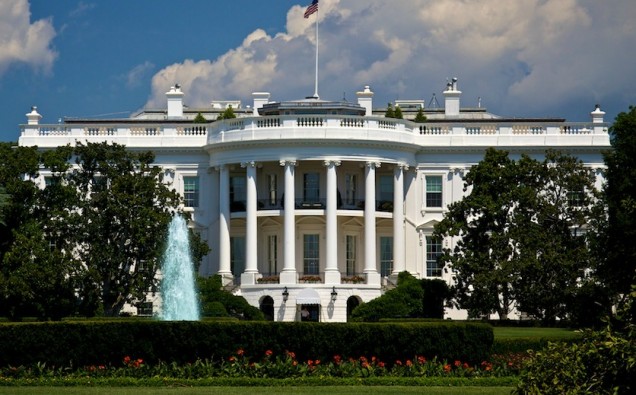
Most Americans want to see the United States focus on its own problems rather than getting involved in global affairs, according to a new survey that also showed increasing support for hike in defense budget to counter an array of threats facing the country – including that from the ISIS-led extremism.
The Survey by PEW Research Center comes as the field for America’s next president is now almost clear with Donald Trump emerging as Republican’s presumptive candidate and Hillary Clinton closing in to clinch the Democratic nomination. Both candidates have contrasting views on foreign policy and defense spending.
For instance, Trump looks at NATO as “obsolete”, a military alliance that has given the United States leading role in dealing with regional conflicts and countering global terrorism. For Clinton, NATO is “one of the best investments America has ever made.”
The findings of the survey imitate conflicting visions of the two candidates about America’s global role and foreign policy issues, such as dealing with terrorism, the nature of global threats and the country’s military role in global affairs. The survey was conducted before other Republican candidates, Ted Cruz and John Kasich suspended their campaigns last week.
But, most of the Americans share the same view when it comes to defining America’ role and level of its engagement in global affairs, according to the survey conducted April 12 to 19 among 2,008 U.S. adults. While support for U.S. global engagement increased modestly, still 57 percent of respondents want to see American deal with its own problems and let other countries get along as best they can, compared with 37 percent who say the U.S. should help other countries deal with their own problems.
The majority view of the U.S. to focus on its own problems comes close to Trump’s electoral slogan of “America first”, who recent national polls showed was closing gap with Clinton. Contrary to the earlier view of Clinton’s landslide victory, the swing –state surveys from Quinnipiac University and a national snapshot from Public Policy Polling called it a close general-election race.
Americans, however, are divided when it comes to sending U.S. ground troops to fight ISIS militants in Iraq and Syria – 46 percent favor while 50 percent opposed it.
While majority of Americans support the military campaign, most do not think it is going well at present. About six-in-ten (58%) say the campaign against militants in Iraq and Syria was going not too or not at all well. Only 38 percent has a favorable view, describing it “fairly well”.
One area that has seen major agreement is the military campaign against ISIS militants in Iraq and Syria. As much as 62 percent continues to approve U.S. military action against militants as against 33 percent who disapprove. Nearly the same amount – Republicans (66%) and Democrats (65%) support the U.S. military campaign against ISIS.
Republican voters are more pronounced in their support for increasing defense spending with two-thirds of conservative Republicans (67%) in favor, up from 28 percent when the question was asked last time. Only 20 percent of Democrats are for hiking defense budget as against 30 percent who want to scale down the spending, and about 49 percent who support keeping it to near current level.
A plurality forty percent of respondents said the spending should be kept roughly the same. That view is again close to Trump’s vision of rebuilding the army which has seen sizeable cut in numbers by the Obama’s administration. Clinton in September proposed a high-level commission to examine U.S. defense spending, alluding to the need for cutting down military expenses.
The Pew Survey also found increasing support for hike in defense spending, supported by 35 percent. The same question when asked last time in November, 2013 had only 23 percent supporting increase in the budget with 28 percent favoring cut in defense spending.
President Obama’s legacy trade deal – Trans-Pacific Partnership – has been lambasted by Republican candidates. Clinton’s party rival, Senator Bernie Sanders, has scored several victories against Clinton over his opposition to TPP which the former Secretary of State had supported. Clinton has of late expressed reservations over the deal.
Like politics and regional conflicts, people also seem to be wary of U.S.’ involvement in the global economy which 49 percent of the respondents say was a bad thing as it lower wages and costs jobs.














